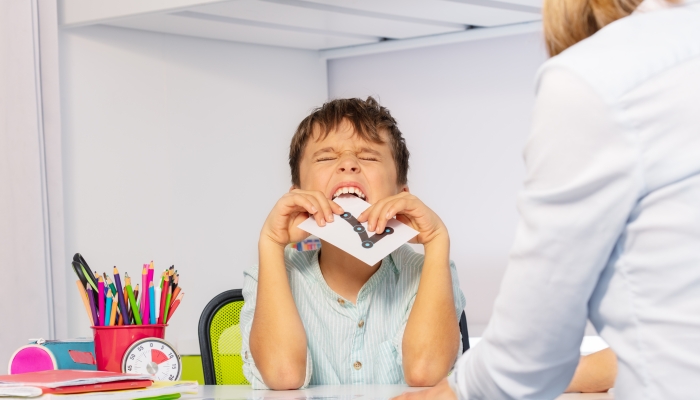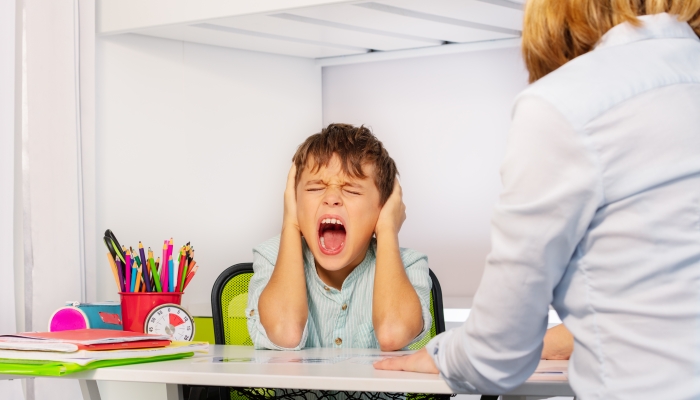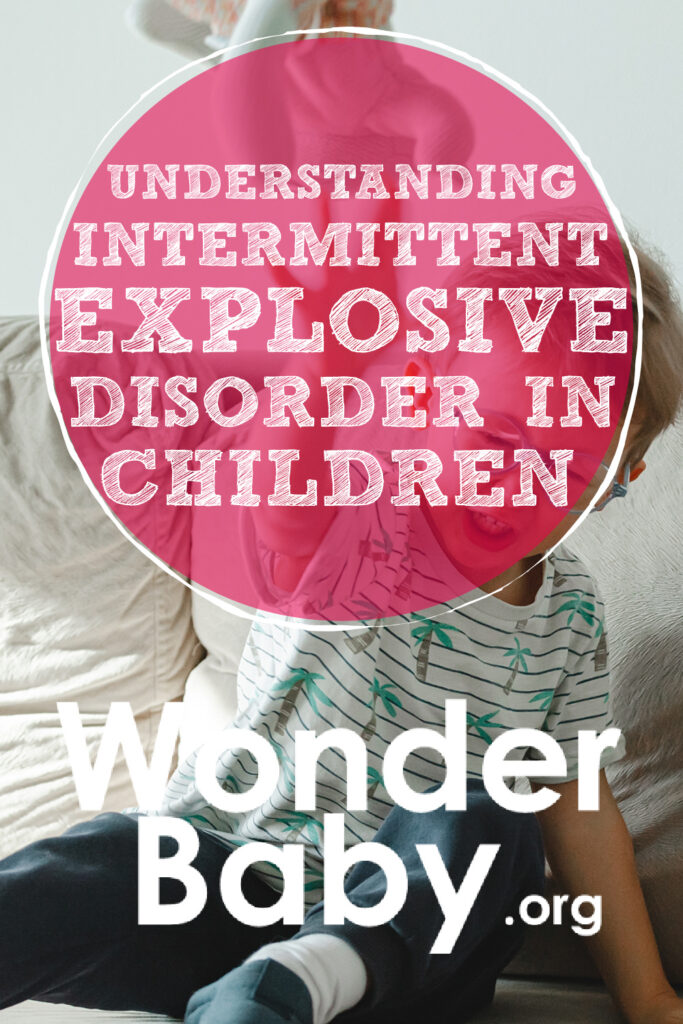Understanding Intermittent Explosive Disorder in Children

- Intermittent explosive disorder (IED) is a mental health disorder with impulsive episodes of intense anger.
- Children with IED benefit from therapy and sometimes medication to reduce explosive outbursts.
- Collaboration with parents and children can build resilience and minimize some explosive outbursts.
- Parenting a child with explosive behaviors is hard; find ways to increase your support and take care of yourself.
All children get angry. Temper tantrums can be developmentally appropriate. But does it feel like your child’s explosive outbursts are excessive?
One minute, you’re playing nicely together; the next, your child is hitting, slapping, screaming, or destroying something. It seems like your child has no control over his anger.
Does it feel like you’re walking on eggshells, uncertain when your child will explode next?
Frequent aggressive outbursts and a low tolerance for frustration could be indications of intermittent explosive disorder (IED) in children.
Understanding IED and early interventions to support your child will positively impact your child’s future.
Defining Intermittent Explosive Disorder

Intermittent Explosive Disorder (IED) is considered a disruptive impulse-control mental health disorder. IED involves impulsive episodes of intense anger that are disproportionate to the stressor that triggered the outburst.
IED outbursts might include:
- Temper tantrums.
- Rage.
- Verbal or physical fights.
- Harming an animal.
- Damaging property.
Unlike temper tantrums or sensory meltdowns, these outbursts are impulsive, intense, disproportionate to the stressor, and not premeditated. A child diagnosed with IED is quick to anger and typically has a low tolerance for frustration. Sometimes, a child with IED is described as a child who can’t control his anger.
Epidemiology and Demographics
IED is diagnosed in children six years or older and is most common in late childhood or adolescence. According to the Diagnostic and Statistical Manual of Mental Disorders, some studies state that it is more prevalent in males, while others indicate no gender difference.
Common Manifestations in Children
Intermittent explosive disorder has a rapid onset. A child with IED will have a sudden verbal outburst to a stressor that would typically not result in an aggressive outburst. This explosive outburst will generally last less than 30 minutes.
Sometimes, the outburst leads to physical aggression toward people or property. These outbursts could cause significant distress in the classroom, with peers, or at home.
Although children might blame others for their violent outbursts, most feel remorse and guilt after the episode. Older children know their anger outbursts are inappropriate but feel out of control during the outburst. Some children say they can’t control their actions during the episode and feel a sense of relief from built-up tension afterward.
Causes and Risk Factors

Researchers are unsure of the exact cause of intermittent explosive disorder, but according to a 2023 study11. Shevidi, S., Timmins, M. A., & Coccaro, E. F.. Childhood and parental characteristics of adults with DSM-5 intermittent explosive disorder compared with healthy and psychiatric controls. Comprehensive Psychiatry. 2023;122, 152367. https://doi.org/10.1016/j.comppsych.2023.152367 of adults with IED, biological, environmental, and psychological factors can contribute to the diagnosis.
Biological Factors
Research shows that intermittent explosive disorder more commonly runs in biological families, with first-degree relatives being at an increased risk. Brain imaging also suggests that individuals diagnosed with IED have structural abnormalities in the brain in areas that control behavior and emotional functioning, such as the amygdala.
Environmental Factors
The prevalence of childhood trauma or violence may also be linked to intermittent explosive disorder. Exposure to violence or traumatic events within the first twenty years of life increases the risk of IED. In studies of adults diagnosed with IED, many witnessed violence between parents or caregivers or were physically abused by a caregiver.
Many adults diagnosed with IED also reported a chaotic family environment growing up. Due to the tumultuous household, many identified limited bonding with a parental figure and limited protective factors in childhood.
Psychological Components
Individuals diagnosed with IED may have other underlying mental health conditions, often diagnosed later in life. They may include mood or anxiety disorders and substance use disorders.
Individuals with personality disorders, like antisocial personality disorder or borderline personality disorder, are at a greater risk of having intermittent explosive disorder. Individuals with IED have problems with self-control of emotions and behaviors.
Diagnosing IED in Children

If you believe your child might have characteristics of IED, talk with your healthcare provider. They will refer you to a professionally licensed practitioner with experience diagnosing IED.
A professional will utilize the diagnostic criteria in the Diagnostic and Statistical Manual of Mental Disorders. They will meet with your child and conduct clinical interviews with you and other important people in your child’s life.
Diagnostic Criteria
Your child must be at least six years old to be diagnosed with IED. A licensed professional will conduct interviews to gather information to see if your child has frequent minor outbursts at least two times a week on average for at least three months or at least three infrequent major outbursts that cause harm to people or property within a year.
In addition, to make a diagnosis, they must assess whether:
- The level of aggression is disproportionate to the stressor.
- The outburst is not premeditated.
- The outburst is impulsive and/or anger-based.
- The outbursts cause distress in your child’s life.
- The behaviors are not explained by another mental health disorder or substance use.
Assessment Tools
A professional will use structured clinical interviews with important people in your child’s life. Parents, teachers, and other caregivers might complete rating skills for the professional to learn more about your child’s medical history, biological family, relationships, and impulse control.
The Role of a Multidisciplinary Team
Involving psychologists, psychiatrists, pediatricians, and educators will help ensure your child gets an accurate diagnosis and the best treatment possible. A comprehensive assessment of your child helps make sure another medical condition, such as a head injury or another mental health diagnosis, doesn’t better explain the outbursts.
An accurate diagnosis will best guide your child’s treatment plan and intervention techniques.
Treatment and Intervention

Once a child is diagnosed with IED, a treatment plan is created to best fit the child’s needs. This treatment plan may include psychotherapy, medications, and school-based interventions.
Therapeutic Approaches
Psychotherapy is the primary treatment approach for children with intermittent explosive disorder. Therapy focuses on helping a child change their thoughts related to aggression and the outbursts they experience. Therapists may use different therapeutic approaches, such as:
- Cognitive-behavioral therapy (CBT).
- Anger management training.
- Family therapy.
Using these therapies, a child will learn to manage regular daily situations while decreasing aggressive impulses. With CBT, children will learn new ways of thinking and how thoughts affect actions. In therapy, a child might also learn relaxation techniques and coping skills.
Family therapy can be beneficial for helping parents or caregivers understand their children’s triggers and learn how to best help their children at home.
Medications
Depending on your child’s age and symptoms, a healthcare provider might recommend medication in addition to therapy. Medications can help increase your child’s tolerance for triggering situations. Common medications prescribed to children with IED include:
- Antidepressants.
- Antipsychotics.
- Anticonvulsants.
- Anti-anxiety medications.
- Mood regulators.
Discuss with your child’s multidisciplinary team what type of medication is best for your child. All medications list possible side effects. This doesn’t mean your child will have these side effects, but discuss with a healthcare professional the best ways to monitor and manage potential side effects.
School-Based Interventions
Children with intermittent explosive disorder often struggle with aggression and outbursts at school. School-based intervention programs can positively support your child.
If your child is diagnosed with intermittent explosive disorder, he will receive an individualized education plan (IEP) tailored to his needs. Be prepared for your child’s IEP meeting. Include your child’s multidisciplinary team in IEP meetings to support your child’s needs. Your child’s plan might include classroom strategies or groups created to help build coping skills and reduce aggressive outbursts.
The IEP will likely include a behavior intervention plan. These behavior goals will help your child’s teacher and other school staff consistently support your child.
Research shows that school-based prevention programs can be highly effective for children with aggressive behaviors. A meta-analysis22. Wilson, S. J., & Lipsey, M. W.. School-Based Interventions for Aggressive and Disruptive Behavior: Update of a Meta-Analysis. American Journal of Preventive Medicine. 2007;33(2), S130–S143. https://doi.org/10.1016/j.amepre.2007.04.011 of several school-based intervention programs found that programs targeted for children with aggressive behaviors effectively reduce behaviors and aggression in the classroom.
Supporting a Child with IED

When a child exhibits intense and aggressive outbursts, it can be overwhelming and scary. The parenting strategies you’re accustomed to or are trying might not work for your child with explosive behaviors.
Parenting Strategies for Explosive Children
Parenting strategies for children who struggle with explosive behaviors focus on collaboration between the child and the parent. Clinical psychologist and author of “The Explosive Child,” Ross Greene, Ph. D., educates parents on using a collaborative and proactive solutions (CPS) approach. This approach involves including your child in solving problems together.
Instead of creating rules and consequences to share with your child, include their input. Consistent boundaries and expectations are essential for all children, but involving them in the process can generate more teamwork.
Be proactive and discuss goals when your child is calm. Choose realistic, developmentally appropriate goals and prioritize them. Don’t try to make several changes at once. Prioritize safety and problems that have the most significant impact on your child’s life.
It’s important to understand that all behavior is communication. Try to identify triggers that lead to explosive behaviors. Focusing on what your child is trying to communicate in that moment, not the behavior itself, will shed light on skills your child lacks. Children with IED might lack essential skills such as flexibility, problem-solving, and frustration tolerance.
Identifying the skills your child needs to build will also help build resilience for your child and decrease explosive behaviors.
Building Resilience in the Child
It doesn’t feel good to feel out of control. Although children may experience a sense of relief after an explosion, they don’t want to have explosions. These explosive outbursts can be embarrassing, overwhelming, or exhausting. Building skills in your child at an early age can positively impact their peer relationships and success at home and school.
Teach your child coping skills such as grounding techniques and breathing strategies. Practice these coping skills often, especially when your child is feeling calm. Social skills groups at school or therapy can help your child develop and practice coping skills.
Encourage self-awareness and self-control. Your child will benefit from learning about his emotions and how to express them. This will also help improve your child’s social skills and build friendships.
Resources for Families
Find ways to reduce your stress and increase your self-care. Parenting a child with explosive behaviors is hard, and you need to take care of yourself.
Talk with your child’s multidisciplinary team to see if there are local support groups you can join, or look online for support communities. Connecting with other families with similar experiences can help reduce stress and provide a safe place to share frustrations and learn about additional resources to support your child.
References
- Shevidi, S., Timmins, M. A., & Coccaro, E. F. (2023). Childhood and parental characteristics of adults with DSM-5 intermittent explosive disorder compared with healthy and psychiatric controls. Comprehensive Psychiatry, 122, 152367. https://doi.org/10.1016/j.comppsych.2023.152367
- Wilson, S. J., & Lipsey, M. W. (2007). School-Based Interventions for Aggressive and Disruptive Behavior: Update of a Meta-Analysis. American Journal of Preventive Medicine, 33(2), S130–S143. https://doi.org/10.1016/j.amepre.2007.04.011

Related Posts

Behavior
5 Emotional Regulation Activities for Kids
Want to teach your child how to regulate emotions? Here are emotional regulation activities for kids that can help!

Behavior, Special Needs
5 Tips for Dining Out with Children Who Have Sensory Sensitivities
Worried about dining out with sensory sensitivities? Try these tips for less stress and more fun the next time you take your family out to eat.

Behavior
Is Your Child a Compulsive Liar?
Are you worried your child is a compulsive liar? Read this article for everything you need to know about compulsive lying in children.